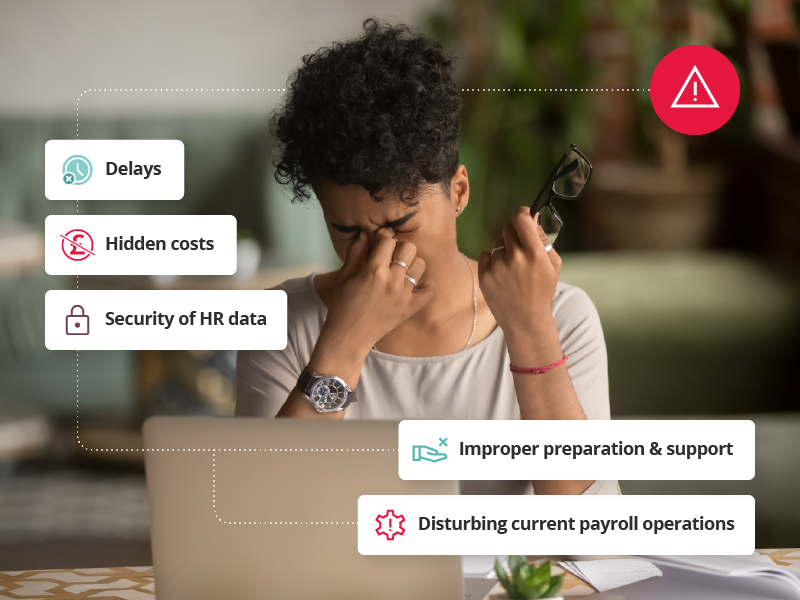
Updated 7/6/2023
In this article, we highlight 5 common problems with outsourced payroll integration. This will help you prepare for any potential issues that may arise. It will also help you understand what to ask during your initial conversations with HR software vendors.
As an SMB, outsourcing your payroll is a logical step. When done correctly, it can free up your time, remove risk of error and non-compliance, and most importantly, get your staff paid on time and correctly. However, like any business integration, you may encounter some issues along the way. And in this article, we aim to cover them in detail.
Here at Access PeopleHR, we understand that when deciding on your HR requirements, it’s important to have a balanced perspective. So, whilst we’re firm advocates of outsourced payroll, it’s only right to consider potential problems. Working with an outsourced payroll bureau service won’t be the best solution for everyone. By reading this article, you should have a firmer idea of whether it’s right for your business.

1. Delays
One of the first issues with outsourced payroll integration that we’ll cover is delays. It’s your responsibility to submit crucial information needed for processing before the defined cut-off times. Failure to do this could impact the timeliness of payroll, and even when your staff receive their pay.
When outsourcing your payroll, you’ll need to plan ahead. You will have strict deadlines set by your payroll company. This will ensure they process payroll on time. You must take into account factors such as holidays, your payroll liaison being away, or glitches in your technology. All this could impact data transfers.
Many businesses only have time to focus on payroll outside of working hours. Depending on the amount of time it takes to get things to your vendor (and when they receive it), your employees' pay could be delayed.
Paying your employees on time is essential for compliance and is a key driver in employee satisfaction. In fact, studies show that just two payroll errors can cause 49% of employees to start job hunting.
2. Disturbing current payroll operations
Another one of the outsourced payroll integration problems we hear of is the disruption that switching to an outsourced payroll system can cause. These problems tend to arise when there is no comprehensive change management plan in place. You may also have to adapt some of your existing processes to work with the new system.
Choosing a payroll service provider that adapts to your operational style will help you avoid costly downtime or operational interruptions. We recommend allocating a dedicated person(s) to oversee the payroll system migration to ensure things run smoothly.
It is also a good idea to consider a payroll outsourcing service that has developed or owns the software it uses. Any changes (such as legislative updates) can be made seamlessly if your provider owns its software. You'll also be able to save money by using owned software, as your payroll provider won't have to enter into a third-party agreement to license it.
HR and Payroll software that avoids integration issues can help mitigate many of these challenges by offering a more seamless and adaptable solution.
3. Security of HR data
One of the perceived outsourced payroll integration problems is security. You’ll have no doubt seen headlines within the media of different security breaches in recent years. In fact, recent statistics from DBXUK found that 39% of businesses and 26% of charities reported having some kind of cyber security breach or attack in 2021. It’s not surprising that businesses worry about placing sensitive data about their employees in someone else’s hands.
This fear is understandable. And whilst instances like this are few and far between, it can still dissuade businesses from outsourcing their payroll.
So, how can this security risk be mitigated? It's important to make sure the payroll provider you choose is reputable and has policies and procedures to protect your data.
Questions to ask them:
- What processes are you compliant with?
- Where is the data you have hosted?
- Who can access the data?
- Do you have on-site security measures in place?
- How will my data be backed up?
- How will my data be stored and transmitted?
- What firewalls/antivirus protection do you use?
- If a breach were to occur, what are your protocols?
Most reputable providers with a strong track record will be able to provide clarity to the answers above.
4. Hidden costs
One of the problems with outsourced payroll integration is the cost you weren’t prepared for. When selecting a payroll service provider, you need to consider the total cost of service, not just the price per payslip. Whilst certain services - like tax filings and direct deposits - are normally included as standard, other services may not be. This includes things like quarterly and year-end reporting.
There are more ‘hidden’ costs that you should be aware of, which we’ll cover below.
Hidden outsourced payroll costs include:
- Setup fees
- Change requests
- End of year fees
- Reports
- Broken contracts
Some of the above services may be included in your subscription. We advise you to gain clarity on the above points before entering into an agreement with a provider.
If you’re interested in finding more about the impacting factors on payroll services costs, and how to save your SMB some money, read our outsourced payroll services guide.
5. Improper preparation & support
In the initial setup phase, outsourcing your payroll will require a certain amount of internal resource. It’s important not to underestimate this. You will need to work closely alongside your provider to ensure a smooth transition, whilst maintaining a regular service. Let’s not forget - people still need to get paid!
Establishing a division of work is important. Be clear on what you need to do, what your payroll provider needs to do, and how long each task/step will take.
Support from your provider is also crucial. If something goes wrong with payroll processing, you will need to rely on your provider to fix it. Depending on your customer support agreement, fixing errors can be a complicated process. Bottom line: closely consider the level of support you get as part of your subscription.
Next steps
If you’re an SMB struggling with the responsibility of payroll, then outsourcing it should be a top consideration. And whilst this article leans on some of the issues with outsourced payroll integration, we firmly believe that it is a sensible choice for most SMBs.
Benefits of outsourced payroll:
- More efficiency across your business
- Long-term savings
- Improved security
- Flexibility
- Reduced risk of non-compliance
The key takeaway is this: do your research. A lot of the problems with outsourced payroll integration we’ve covered in this article can be dealt with if you select an honest and reputable payroll service provider. Here at Access PeopleHR, we provide an accurate, managed and flexible payroll service – especially designed for SMBs. Check out our payroll outsourcing services for more information. With over a thousand years of combined experience in payroll, we’re well-versed in answering any questions you may have.
You might be interested in:
If you found today’s read interesting, be sure to check out our other articles:
